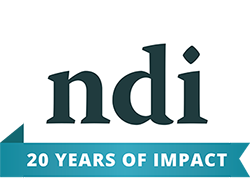NDI is united with our peer organizations in advocating for evidence-based research, programs and policy to benefit autistic people and all other people with disabilities. Millions of autistic people and those with other developmental disabilities are already integral to U.S. society as full members of their communities and participants in civic and economic life. As the nation’s leading organization focused on advancing financial inclusion and economic security for all people with disabilities, NDI supports funding research, programs and policies that promote human dignity and increase opportunity.
Public claims suggesting that autistic people and other people with disabilities cannot pay taxes, attain employment or participate in the community are inaccurate and perpetuate harmful stereotypes. Over 37% of working-age people with disabilities are employed at least part-time and over 9% are self-employed; all workers with disabilities, including autistic workers, pay income tax just as their counterparts without disabilities. Even people with disabilities who are not currently employed regularly pay taxes, with low-income disabled people most likely to pay higher taxes because of the added costs of living in poverty or with a disability. NDI has long recognized the impact of the poverty tax and the disability tax in furthering barriers to economic security and opportunity for disabled people. Stigmatizing language and inaccurate, outdated ideas about autism will not increase opportunity, address economic insecurity, or contribute to American economic growth.
NDI supports maintaining funding for critical programs such as Medicaid, Social Security administered benefits programs, those overseen by the Administration for Community Living, and consumer protection activities of the Consumer Financial Protection Bureau. These federally funded programs and related research activities are vital to ensuring pathways to economic security, including through employment, access to credit, and access to housing in the community. Many autistic people and those with other disabilities rely on Medicaid-funded services to access workforce development opportunities, including job training and job search assistance, as well as to maintain employment once hired through services such as job coaching, accessible transportation, and health care access.
Federal research funding should reflect the need for improved supports and services to increase mainstream economic participation and community integration. As of the end of 2024, people with disabilities, including many autistic people, have opened 195,542 ABLE accounts nationwide with $2.306 billion in assets under management. Increasing employment for people with disabilities – including autistic people – by just 5% from current levels would lead to further significant economic gains, including 617,260 new jobs, a $28.15 billion increase in individual income and potential for increased savings opportunities, and a $6.25 billion increase in tax revenue. These increases are attainable when policymakers focus on engagement with the experts in our community who know what works and what people with disabilities need to succeed.
NDI affirms the worth and value of all people with disabilities regardless of employment status. We encourage policymakers to collaborate with members of the autistic and broader disability communities to develop and implement social and economic policies that support the ability of all disabled people to thrive in the communities of their choice.



